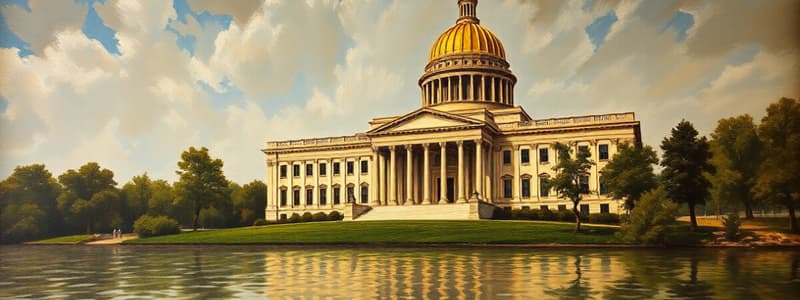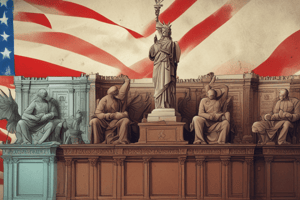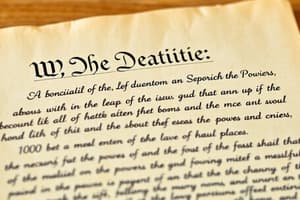Podcast
Questions and Answers
Which of the following is an explicit limitation placed by the Constitution on the use of the commerce power?
Which of the following is an explicit limitation placed by the Constitution on the use of the commerce power?
- Taxation of exports
- Prohibition of favoring one state’s ports over another’s
- Prohibition of requiring vessels from one State to pay duties in another State
- All of the above (correct)
Which of the following is an expressed power?
Which of the following is an expressed power?
- Power to draft people into the armed forces
- Power to raise an army and navy
- Power to punish someone for not paying their taxes
- All of the above (correct)
After the House has impeached a President, what must happen next in order to remove that President from office?
After the House has impeached a President, what must happen next in order to remove that President from office?
- The people must vote
- The State legislatures must vote
- The President must resign
- The Senate must convict the President (correct)
Which institution has the responsibility of confirming or rejecting presidential appointees and treaties?
Which institution has the responsibility of confirming or rejecting presidential appointees and treaties?
Those who favored a broad interpretation of the constitutional powers given to Congress were known as
Those who favored a broad interpretation of the constitutional powers given to Congress were known as
Congress is given investigatory powers in order to
Congress is given investigatory powers in order to
Flashcards
What are the explicit limitations on the commerce power?
What are the explicit limitations on the commerce power?
The Constitution explicitly limits the power of Congress to regulate interstate commerce. This limitation prevents Congress from taxing goods exported from the United States, favoring one state's ports over another's, or requiring ships from one state to pay duties in another state.
What are expressed powers?
What are expressed powers?
Expressed powers are those specifically listed in the Constitution. These include the power to raise an army and navy, punish tax evasion, and draft people into the military.
What happens after a president is impeached?
What happens after a president is impeached?
After the House of Representatives votes to impeach a president, the Senate must hold a trial to determine whether to convict the president and remove him from office.
What is the Senate's role in treaties and appointments?
What is the Senate's role in treaties and appointments?
Signup and view all the flashcards
Who are liberal constructionists?
Who are liberal constructionists?
Signup and view all the flashcards
Why does Congress have investigatory powers?
Why does Congress have investigatory powers?
Signup and view all the flashcards
Study Notes
US Constitution - Powers and Limitations
-
Explicit Commerce Limitation: Prohibition of favoring one state's ports over another's and requiring vessels from one state to pay duties in another state. Taxation of exports is also a limitation.
-
Expressed Powers: Power to draft people into the armed forces and to raise an army and navy.
-
Impeachment Process: After the House impeaches a president, the Senate must convict the president to remove them from office.
-
Presidential Appointments and Treaties: The Senate has the responsibility of confirming or rejecting presidential appointees and treaties.
-
Broad Interpretation of Congressional Powers: Those who favored a broad interpretation are known as "Liberal Constructionists".
-
Congressional Investigatory Powers: Congress may investigate matters related to its lawmaking powers, examine presidential appointments and potentially bring charges against presidents or vice-presidents.
Studying That Suits You
Use AI to generate personalized quizzes and flashcards to suit your learning preferences.




